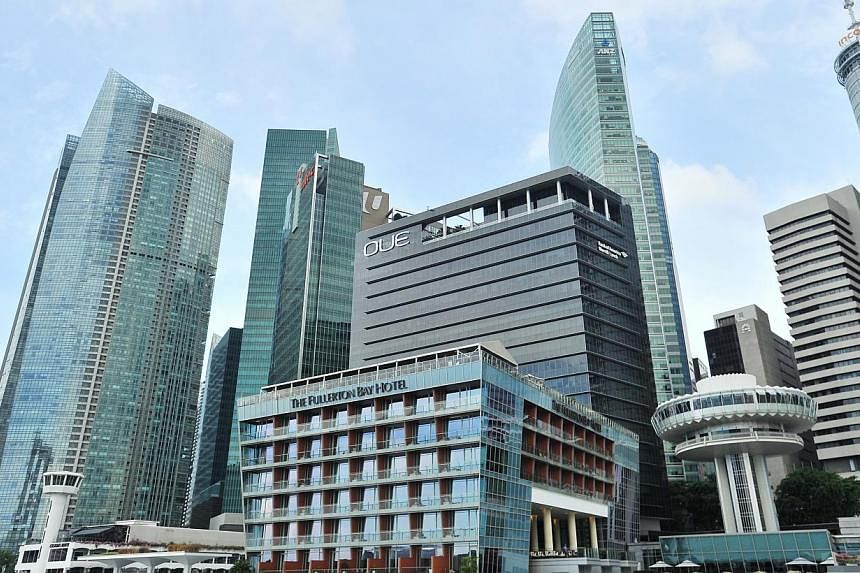Singapore saw the highest increase in office rentals this year among the core markets in the region, followed by Tokyo and Hong Kong, as tightening vacancies continued to prevail, Cushman & Wakefield said in a report on Friday.
Rents for prime and Grade A spaces in Singapore's core commercial districts rose at an average of 1.6 per cent in the last quarter of 2014 to seal a robust 10.9 per cent rise for the full year, the commercial real estate services firm said.
These conditions will only be alleviated starting in 2016, when two major projects in the CBD, Marina One and Guoco Tower, is delivered with 2.8 million sf of new office space, said the agency. New supply in the suburbs will also increase as the decentralization of the island's commercial hubs gathers pace, it added.
"While the tight supply has played a part in pushing up rents for offices here, leasing momentum has also been sustained at a level that has gradually eroded vacancies and tilted the market in the landlord's favour," said Ms Sigrid Zialcita, Cushman & Wakefield's managing director of research for Asia Pacific. "This is due to the island's continued allure for companies to base at least a part of its regional operations here."
General Motors shifted its international headquarters here from Shanghai to take advantage of the rising demand and lower labour costs in South-east Asia, occupying the 30,000 sf of space vacated by global financial firm Bank of America Merrill Lynch. Vodafone also recently consolidated its presence here by expanding its offices here.
This underscores the resilience of the office leasing market, which has benefitted from a more diverse economic base, said Cushman & Wakefield.
Firms from sectors like energy, resources and consumer products, and increasingly, IT and media and communications, are taking up some of the slack left by the financial sector, said Mr Toby Dodd, Cushman & Wakefield's Singapore managing director.
The agency highlighted how new tech and media related companies has emerged to be an important driver of occupancy rates in 2014. Together, these companies accounted for about a fifth of the new leases signed year-to-date this year, as compared to 6-7 per cent last year.
LinkedIn, for example, took up 50,000 sq ft of space that was vacated by Barclays in Marina Bay Financial Centre Tower 2 while Publicis moved into Income@Raffles, occupying over 30,000 sf.
This makes the leasing market here vastly different from the situation in Hong Kong, which remains very dependent on the financial sector, the implications of which could ring harder, especially with some of the more stringent regulation from Basel III due to kick in next year, Ms Zialcita said.
She added however that regional banks, which have not been affected as much in the financial crises, remain well placed to implement the requirements and have been expanding.
For instance, Japanese banking giant, Mizuho Financial Group, which recently set up its headquarters for its Asia Transaction Banking Division here, is planning to increase its headcount by a third when it moves into its new premises in Asia Square Tower 2 next year.
Cushman & Wakefield said rentals for prime and Grade A office spaces here will continue to rise in 2015 but at a more moderate pace of 5.7 per cent. Average rents for office spaces in the Marina Bay area will likely breach the US$14 per sq ft per month, while those in Raffles Place will hit an average of US$11 psf a month, the agency said. Total take-up of office space in the core commercial districts is estimated to reach 1 million sq ft of space in 2015.
About 600,000 sf of secondary spaces is expected to emerge from companies relocating, balanced against the withdrawal of about 400,000 sf from Equity Plaza and 2HR.
This as well as landlords' concern of impending flight risk will act to restrain rental growth,? Mr Dodd added. The resultant slower rent growth, as a result of demand-supply dynamics, will overall be healthy for the market, he said
Rental gains in Tokyo will likely pip the republic's next year, said Ms Zialcita.
However, she said Singapore's economy, on the whole, is on a firmer footing and the office sector will offer the best fundamentals in the region, as compared to the markets of Australia and South Korea, which will face some instances of excess supply. Vacancies in the Singapore market will fall to be the lowest as compared to the rest of the developed countries in the region, she added.

